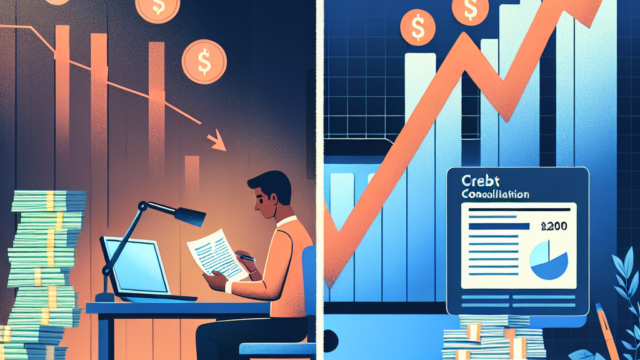In today’s fast-paced world, managing your finances can often feel like a daunting task. One common financial challenge many individuals face is credit card debt. If you find yourself juggling multiple credit card bills with high-interest rates, it’s time to consider the art of credit debt consolidation.
What Is Credit Debt Consolidation?
Credit debt consolidation is a financial strategy that involves combining multiple high-interest credit card debts into a single, more manageable debt. This approach not only simplifies your monthly payments but can also lead to substantial savings on interest payments. But how does it work, and what are the different types of credit debt consolidation?
Types of Credit Debt Consolidation
There are several methods to consolidate credit card debt:
- Balance Transfers: This involves transferring your existing credit card balances to a new card with a lower or 0% introductory APR.
- Personal Loans: You can take out a personal loan to pay off your credit card debts and then focus on repaying the loan.
- Debt Management Plans: These are typically offered by credit counseling agencies and involve negotiating lower interest rates and monthly payments with creditors.
Each consolidation method has its advantages and disadvantages, depending on your financial situation.
Benefits of Credit Debt Consolidation
One of the primary benefits of credit debt consolidation is the potential for significant interest savings. By consolidating your debts, you may secure a lower interest rate, which means more of your payments go towards the principal balance rather than interest charges. Additionally, managing a single payment can be much more convenient and less stressful.
Assessing Your Financial Situation
Before jumping into credit debt consolidation, it’s crucial to assess your financial situation. Take a close look at your outstanding debts, interest rates, and your ability to make consistent payments. Determine whether consolidation is the right choice for you at this stage.
The Credit Debt Consolidation Process
Once you’ve decided to proceed with credit debt consolidation, follow these steps:
- Research: Explore different consolidation options and choose the one that best suits your needs and financial situation.
- Apply: Apply for the chosen consolidation method, whether it’s a balance transfer card, personal loan, or debt management plan.
- Transfer or Pay Off: Transfer balances or use the consolidation funds to pay off your credit card debts.
- Create a Repayment Plan: Develop a clear repayment plan to eliminate your consolidated debt efficiently.
Tips for Successful Credit Debt Consolidation
To ensure the success of your credit debt consolidation, consider these tips:
- Create a Budget: Develop a budget to track your expenses and ensure you can make timely payments.
- Stick to the Plan: Adhere to your repayment plan and avoid accumulating new credit card debt.
- Build an Emergency Fund: Set aside some money for unexpected expenses to avoid relying on credit cards.
- Seek Professional Help: If needed, consult with a financial advisor or credit counselor for guidance.
Common Mistakes to Avoid
While credit debt consolidation can be a valuable tool, it’s essential to avoid common mistakes, such as:
- Failing to address the root causes of debt.
- Accumulating new debt after consolidation.
- Neglecting to read the fine print of consolidation agreements.
Building Good Financial Habits
Ultimately, credit debt consolidation is not just about reducing debt; it’s about building a foundation for financial success. Cultivate healthy financial habits, such as regular savings, responsible credit card use, and a long-term financial plan.
In conclusion, mastering your finances through credit debt consolidation is a powerful strategy to regain control over your financial life. By understanding the various consolidation methods, assessing your financial situation, and adopting responsible financial habits, you can pave the way to a debt-free and financially secure future.
